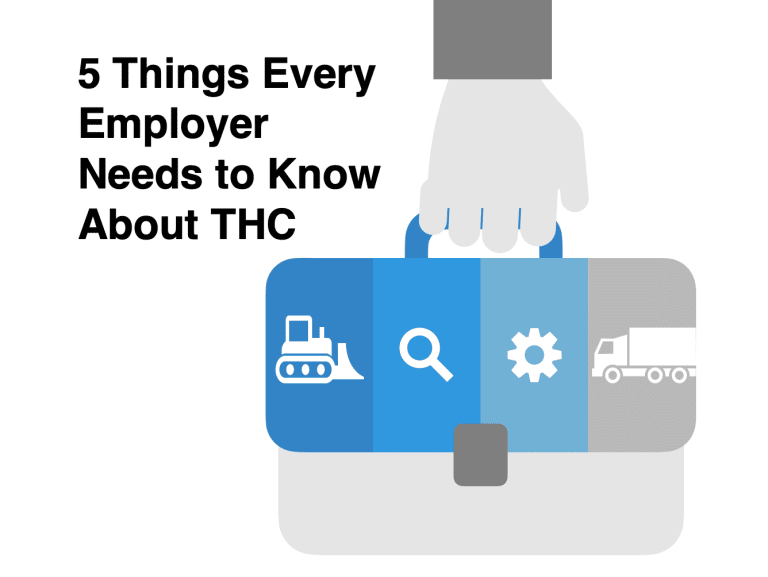While marijuana is the most used illicit drug in the United States, it is also the drug that more than any other drives Americans under age 25 into treatment for drug addiction, and its use can make any workplace less safe and less productive.
Because states have sanctioned marijuana use, employers who are required to maintain — or who simply want — a drug-free work environment are faced with rapidly changing laws posing new challenges to their efforts.
Here are five things we at National Drug Screening think every employer needs to know about use of marijuana and its active ingredient, tetrahydrocannabinol, or THC:
- It’s not the same old marijuana, pot, or weed anymore; it is significantly more potent.
- THC is impairing and addictive.
- THC can affect the mind and body long after use.
- Employers do not have to remove THC from workplace drug-testing panels in states where the drug’s use is sanctioned.
- Employers can have zero-tolerance workplace drug policies.
1. It is not the same old “marijuana” “pot” or “weed” anymore; it is significantly more potent. The dried and cured form of the leafy, green cannabis plant is smoked and commonly known by many names, including marijuana, pot, weed and ganja. However, it is actually cannabis’ active ingredient, THC, that users are really after. THC is the main psychoactive compound in cannabis that produces a euphoric drug high — and impairs a user’s mind and body. In recent years, cannabis producers have mastered, and even industrialized, extraction of THC from the plants’ flowers. In concentrated forms, THC is highly potent — as in far more potent than the dried, smoked stuff. According to the National Institutes on Drug Abuse (NIDA), solvent-based concentrate products have THC levels averaging around 60 percent, with some products reported to have exceeded 80 percent. In comparison, marijuana cigarettes, or joints, have an average THC content of a little more than 15 percent. Smoked marijuana’s odor is easy to detect, while odorless THC concentrate can be hidden; it is infused in foods, drinks, and an array of body care products. THC concentrate also can be inhaled through devices that look like ink pens, asthma inhalers, USB drives or tubes of mascara.
2. THC is addictive. Approximately 30 percent of marijuana users have some degree of problem use, including dependence and addiction, according to recent data cited by NIDA. People who began using THC before the age of 18 are four to seven times more likely to develop problem use than those who started using as an adult. In 2015, about 4 million people in the United States met the diagnostic criteria for a marijuana use disorder, and 138,000 voluntarily sought treatment for their marijuana use, NIDA also reported.
3. THC can affect the mind and body negatively long after use. Adverse consequences of marijuana use are typically categorized as “acute,” or present during intoxication; “persistent,” or lasting longer than intoxication, but not necessarily permanent; and “long-term,” or cumulative effects of repeated use. Acute and persistent adverse effects of marijuana use include impaired learning and coordination. Long-term adverse effects include impairments in learning and memory and increased risk of an array of health problems strongly associated with employee absenteeism and workplace injuries. “One study among postal workers found that employees who tested positive for marijuana on a pre-employment urine drug test had 55 percent more industrial accidents, 85 percent more injuries and 75 percent greater absenteeism compared with those who tested negative for the drug’s use,” NIDA reports.
4. Employers typically do not have to remove marijuana from employment drug-testing panels in states that have sanctioned the drug’s use. Where workplace safety is a priority, use of any impairing substance is a potential — and potentially very serious — problem. Prescription and over-the-counter medications and alcohol are legal to use, and those substances are still included in workplace drug-testing panels. “Eliminating THC would be similar to eliminating Breath Alcohol Testing where alcohol could have contributed to an incident or disqualify an employee from working in a safe manner,” states the National Drug and Alcohol Screening Association — of which National Drug Screening is a proud member. Depending on the circumstances, not testing employees for THC use could put an employer at risk for negligent hiring practices and significant worker’s compensation claims. Note: A few states do prohibit testing for marijuana in pre-employment tests.
5. Employers can enforce zero-tolerance workplace drug policies. Some states have placed limitations on employers when it comes to addressing workers who use marijuana medicinally — so it is important to know the specific accommodations your state requires. However, in states that have not imposed such limitations, enforcement of zero-tolerance policies is acceptable. In court cases where employees have challenged their dismissal, courts generally have ruled in favor of employers who: 1. have a sound drug testing policy 2. regularly make their employees aware of the drug testing policy 3. enforce the policy consistently and 4. maintain a drug testing program to deter employee drug use.







